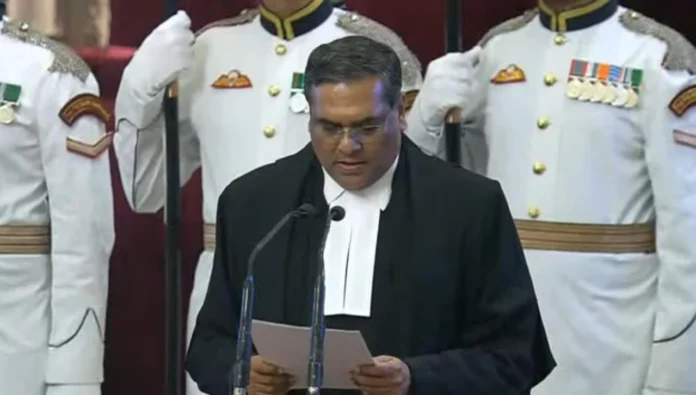Chief Justice of India Sanjiv Khanna on Tuesday said that he would not entertain any oral mentioning of matters for urgent listing.
The CJI told the lawyers mentioning urgent matters that requests for urgent listing should be made either through e-mails or written letters, clearly stating the reason for urgency.
The practice of oral mentioning had gained momentum during the tenure of former CJI DY Chandrachud.
Former CJI Chandrachud permitted lawyers to mention their cases before a Bench led by him at the outset of the day’s proceedings for out-of-turn listings and hearing of cases on grounds of urgency.
President Droupadi Murmu had administered the oath of office and secrecy to the 51st CJI at the Rashtrapati Bhavan on Monday.
CJI Khanna said on the occasion that he was deeply honoured to lead the third pillar of democracy – Judiciary.
Outlining a citizen-centric agenda for judicial reforms, CJI Khanna said that ensuring easy access to justice and equal treatment to citizens regardless of their status was the constitutional duty of the judiciary.
Calling it an integral, yet distinct and independent part of the governance system, the CJI said the Constitution trusted upon the Judiciary the role of a constitutional guardian and the protector of fundamental rights. It was given the responsibility to fulfill the important task of being a service provider of justice, he said on Monday.
The CJI further said that the justice delivery framework provided equal treatment, along with a just and unbiased adjudication. It necessitated a fair opportunity for everyone to succeed, regardless of status, wealth and power. These marked the core principles of judiciary.
The responsibility entrusted on the judiciary affirmed its commitment as protectors of citizens’ rights and as dispute resolvers. It is the constitutional duty of the judges to ensure easy access to justice to all citizens of this great nation, he added.
Identifying pressing challenges facing the judiciary, including the need to reduce case backlogs, make litigation affordable and simplify complex legal processes, CJI Khanna said that the justice system must cater to all citizens.
He emphasised on the importance of making courts more approachable and user-friendly. The CJI said he planned to adopt a self-evaluative approach, which was receptive and responsive to feedback in its working.
He said making judgments comprehensible to the citizens and promoting mediation would be his priority.
The CJI further spoke on criminal case management, stating that it was important to prioritise reducing trial durations, adopt a systematic approach, and ensure that legal procedures were not gruelling for citizens. CJI Khanna further highlighted the importance of promoting mediation to resolve disputes efficiently and provide timely justice.


